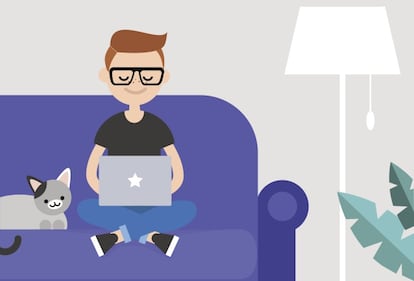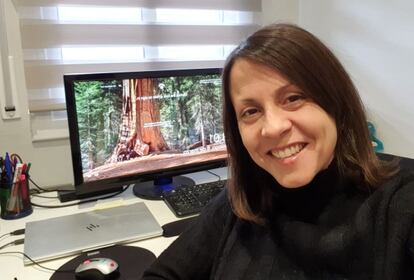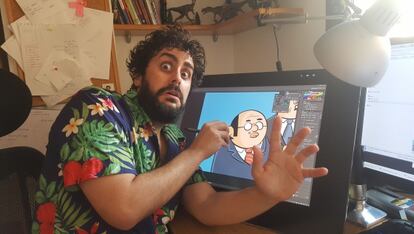How to work from home during Spain’s coronavirus crisis
Six people who have been telecommuting for years share their advice on how to avoid distractions, stay focused and set defined schedules

In an effort to contain the spread of the novel coronavirus, Spain’s health authorities recommended on Tuesday that citizens in Madrid and the Basque province of Álava work from home wherever possible. Working remotely is less common in Spain than in other European countries. According to figures from the European Union’s statistical office Eurostat, 14% of employees work from home in the Netherlands, 13.3% in Finland, and 10% in Austria, while only 4.3% telecommute in Spain, just slightly below the European average of 5.1%. Not all sectors allow for remote work, but the model is easy to implement in many office jobs.
We spoke with several people who’ve been telecommuting for years to find out what advice they would give to people who are not used to working from home. This is what they recommended.
Martha Molina, 38, working from home for six years. Runs a modified vehicle company. “Pretend you are in the office”
“You have to imagine that you’re in an office. Don’t stop for a moment to hang out the washing, do the dishes, or go for a run. If you succumb to these kinds of distractions, you don’t work productively. At first it will feel strange, because after all you are at home. But you have to ignore normal home routines.
“Working from home is great for balancing family and work life. It’s best to make sure that your work hours coincide with the time that no one is at home. When someone else is home, it is easy to lose your concentration. Although that also happens in an office, with people asking you things every two or three minutes.”

Emilio Sánchez, 40, nine years working from home. Publisher. “Don’t work in pajamas”
“When I started working from home, I would get out of bed and go straight to the computer. It was a very toxic habit. I would end up eating breakfast while working. It’s a huge mistake. You have to create routines that allow you to unwind. When you wake up, breathe, respect the sacredness of coffee, listen to the radio, and only then start working.
“Working in pajamas is really nice, but I also recommend avoiding it. If you’re working from home, the best thing to do is shower and get dressed, even if it’s in comfortable clothes. If you don’t, bit by bit you will become more of a hermit. Three days will pass where you don’t see anyone and you will fall into a kind of isolation that does not do you any good. It is a gradual downward spiral that you have to avoid. Although it doesn’t seem like it, just the trip to the office wakes you up, it activates your mind. If you work from home, you lose that. At the end of the day, the best thing to do is to go for a walk to refresh your ideas.”
Esther Soto, 38, five years working from home. Works for a pharmaceutical company. “Set a very clear start and end time”
“This is more advice for the company than for the worker. There must be a good online file system that gives you access to all the documents you need. The company must ensure that there is a good network connection so that time is not wasted. There should also be a good communication system between staff. We use Skype for meetings between two people, as well as larger meetings. They are more efficient than face-to-face meetings, where you end up wasting time with absurd conversations.
“I also recommend being very clear about the time you start and finish work. Because it’s not an office, it’s easy for other colleagues not to know when you start and finish, meaning they never stop contacting you. To avoid this, I close my computer and don’t have my work email installed on my personal cellphone.
“It is also important to be realistic about your capabilities and the objectives set by the company. If you take on more than you can do, you end up working more hours than you should because there is no one to control how many hours you have actually worked, which means you are forced to finish work after your working day is over. You need to clearly define the roles.”

Iván Martín, 36, 10 years working from home. Mobile application developer. “When you take a break you have to truly disconnect”
“It is important to set clearly defined breaks. In the office there is always someone who suggests getting a coffee, but in your house you’re alone and before you know it, you have spent many hours grinding away. Another important tip: when you take a break, you really have to disconnect, or else you never stop. With office colleagues it’s simpler because you can talk about things that are unrelated to work, but it’s more complicated when you’re alone. I think you are more productive from home if you set a well-defined schedule. Working remotely takes a lot of self-discipline.”
Dani Gove, 36, cartoonist. “Differentiate your workplace.”
“It is very important to differentiate your working space from your living space. For a while, I lived in an apartment where the room where I slept was the same as the one where I worked. It was horrible. You get to a point where you don’t know how to separate the two. Work ends up trapping you, you never completely disconnect.”

Sara Piñeiro, 31, four years working from home. Translator. “Avoid the distractions you have at home”
“The most important thing is having the willpower to avoid the distractions you have at home: television, the telephone, the doorbell … another common distraction is social media. You can also waste a lot of time on [social media] in the office, but perhaps you refrain more than you do when you are at home. I recommend using two browsers on your computer: one which has your social media passwords and one that doesn’t. And while you are working, only use the one that doesn’t have your social media passwords.”
Tu suscripción se está usando en otro dispositivo
¿Quieres añadir otro usuario a tu suscripción?
Si continúas leyendo en este dispositivo, no se podrá leer en el otro.
FlechaTu suscripción se está usando en otro dispositivo y solo puedes acceder a EL PAÍS desde un dispositivo a la vez.
Si quieres compartir tu cuenta, cambia tu suscripción a la modalidad Premium, así podrás añadir otro usuario. Cada uno accederá con su propia cuenta de email, lo que os permitirá personalizar vuestra experiencia en EL PAÍS.
¿Tienes una suscripción de empresa? Accede aquí para contratar más cuentas.
En el caso de no saber quién está usando tu cuenta, te recomendamos cambiar tu contraseña aquí.
Si decides continuar compartiendo tu cuenta, este mensaje se mostrará en tu dispositivo y en el de la otra persona que está usando tu cuenta de forma indefinida, afectando a tu experiencia de lectura. Puedes consultar aquí los términos y condiciones de la suscripción digital.









































